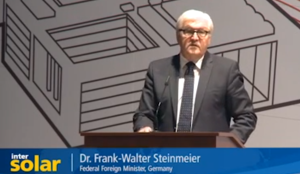Speaking at the first international conference on Germany’s transition to renewable energy (in German: Energiewende) last week, German Foreign Minister Frank-Walter Steinmeier described the shift away from fossil fuels and nuclear power as his country’s “man to the moon project.”
The Berlin “Energy Transition Dialogue 2015” drew nearly 1,000 representatives from 60 countries, according to event sponsors. The Energiewende was formalized into German law in 2000 with the passage of the Renewable Energy Act. That law mandates a phase-out of nuclear power by 2022, steep reductions in CO2 emissions, and aims to generate 80 percent of the country’s power supply by renewable sources by 2050. (Germany today gets 27 percent of its electrical generation from renewables, including wind, biomass, and solar power.)
The conference was timed to precede — and shape — the United Nations Global Climate Conference COP21, scheduled for this December in Paris.
In his opening remarks, German Economic Affairs Minister Sigmar Gabriel, addressed his country’s decision to phase out nuclear power despite the low GHG emissions from that energy source — a choice that is controversial elsewhere, but is widely supported across the political spectrum in Germany:
The ecological sense of the use of nuclear energy is not the point, because we now know that this is the most inefficient and most expensive energy supply. That’s how the debate has switched from an environmental to an economic discussion about the future of our country.
Note: Clean Break, my e-book about the Energiewende, produced for InsideClimate News in 2012, can be found here. My more recent reporting from Germany on developments in the energy transition will appear in Discover magazine this summer.
